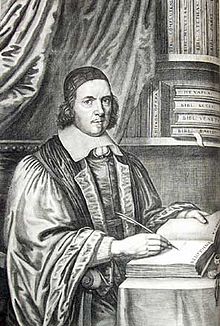Brian Walton (bishop)
| Brian Walton | |
|---|---|
 |
|
| Born | 1600 Seymour, Yorkshire |
| Died | 29 November 1661 (aged 60–61) |
| Nationality | English |
| Alma mater | Cambridge |
| Occupation | Priest, scholar |
| Spouse(s) |
|
| Religion | Anglican |
Brian Walton (1600 – 29 November 1661) was an English priest, divine and scholar.
He was born at Seymour, in the district of Cleveland, Yorkshire. His early education was at the Newcastle Royal Free Grammar School. He went up to Cambridge as a sizar of Magdalene College in 1616, migrated to Peterhouse in 1618, was bachelor in 1619 and master of arts in 1623. After holding a school mastership at Suffolk and two curacies (the second as curate of All-hallows, Bread Street), he was made rector of St Martin's Ongar in London, and of Sandon, in Essex, in 1626. At St Martin's Ongar he took a leading part in the contest between the London clergy and the citizens about the city tithes, and compiled a treatise on the subject, which is printed in 's Collectanea (1752). His conduct in this matter displayed his ability, but his zeal for the exaction of ecclesiastical dues was remembered in 1641 in the articles brought against him in parliament, which appear to have led to the sequestration of his very considerable preferments. He was also charged with Popish practices, but on frivolous grounds, and with aspersing the members of parliament for the city.
In 1642 he was ordered into custody as a delinquent; thereafter he took refuge in Oxford, and ultimately returned to London to the house of William Fuller (1580?-1659), dean of Ely, whose daughter Jane was his second wife. In this retirement he gave himself to Oriental studies and carried through his great work, a Polyglot Bible which should be completer, cheaper and provided with a better critical apparatus than any previous work of the kind.
He was buried in St Paul's Cathedral in London, but the grave and monument were destroyed in the Great Fire of London in 1666. His name appears on a modern monument in the crypt, listing important graves lost in the fire.
...
Wikipedia
